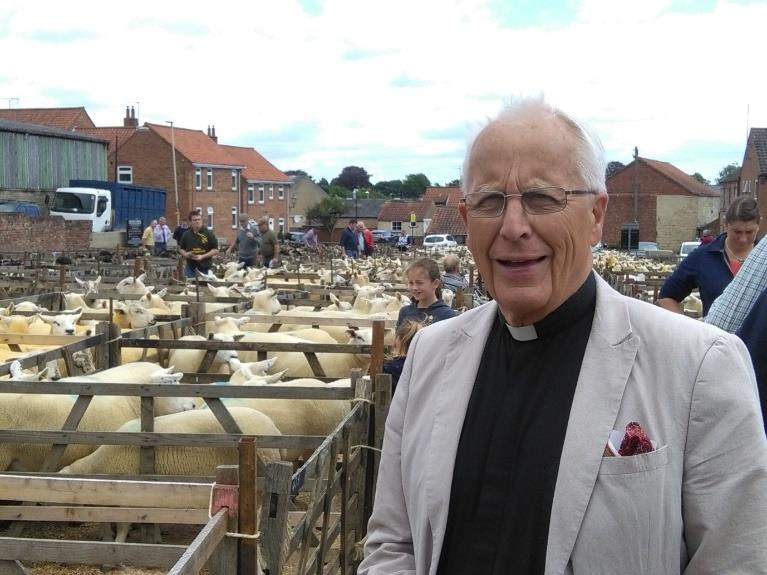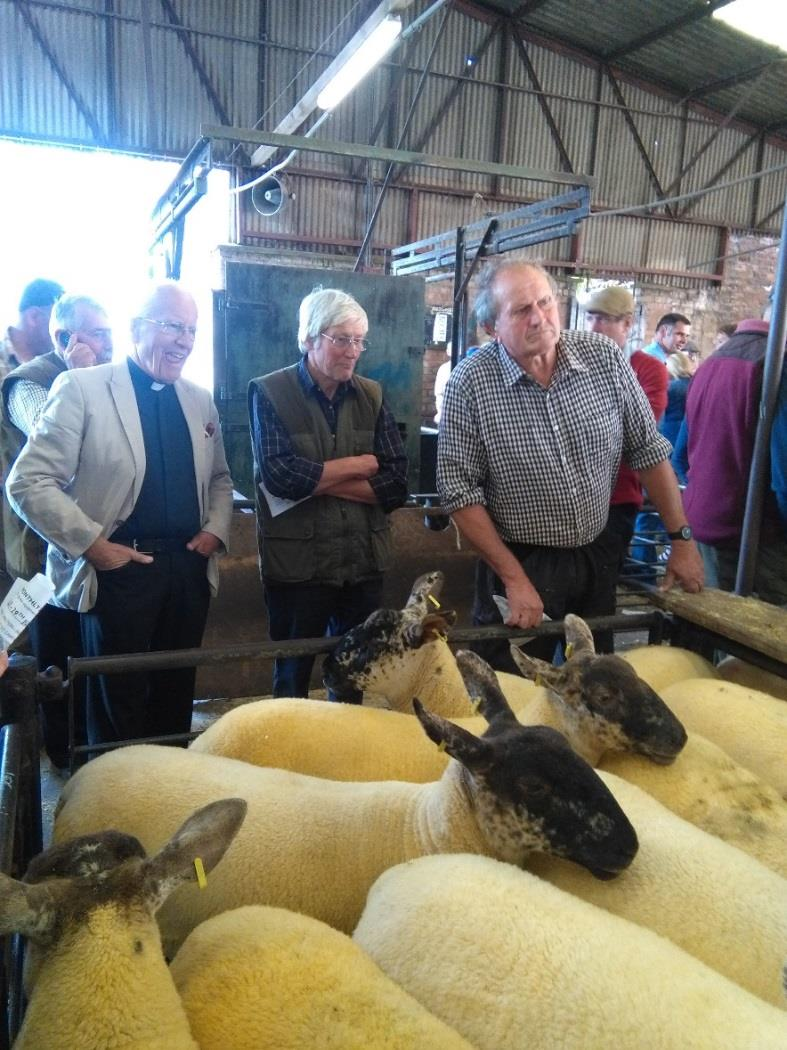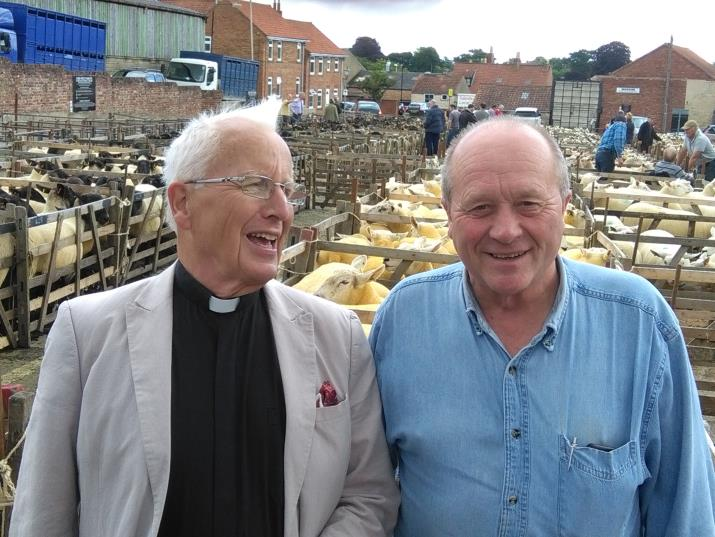Auction Market Chaplaincy
26 February 2021
26 February 2021
 We often talk about the natural world. The BBC has a Natural History Unit. Many of us like to explore nature by walking or driving though our countryside. Actually words like “nature” and “natural” are not really appropriate. The British countryside is extremely varied and beautiful, but it is not natural. It is the result of human endeavour, mostly by farmers. This often forgotten fact is matched by our tendency to forget how vital the farming community is to our way of life.
We often talk about the natural world. The BBC has a Natural History Unit. Many of us like to explore nature by walking or driving though our countryside. Actually words like “nature” and “natural” are not really appropriate. The British countryside is extremely varied and beautiful, but it is not natural. It is the result of human endeavour, mostly by farmers. This often forgotten fact is matched by our tendency to forget how vital the farming community is to our way of life.
This is partly because most of us do not see much of farmers, who tend to function within their own communities and, for obvious reasons, do not live near us. The farmers’ role in looking after the countryside has become much more explicit in recent years as we have become more aware of environmental issues. On July 19th Michael Gove, the farming minister, announced that farming subsidies, currently paid by the EU, will in future depend on how well individual farmers look after the countryside.
This is just one issue facing farmers today, together with other worries caused by Brexit. Many farmers spend hours working alone, many work with frighteningly highs levels of debt and many worry about the future. At present it is the implications of Brexit that loom large, even though many farmers voted for it.
The auction markets have been identified as crucial meeting places for farmers. For many it is their main opportunity for social contact. Retired or semi-retired farmers continue to attend the market as a way of meeting their friends. This is the world in which some of us spend our time working as chaplains. In North Yorkshire there are auction market chaplains at Thirsk, Skipton, Malton, Bentham, Ruswarp, Selby, Northallerton and Hawes. Some are ordained and some are lay and they come from various denominations.
 Those who are ordained ministers in post see the work as part of their overall work, while those who are retired approach it as a voluntary contribution to the work of the churches. All function with the goodwill, and on behalf of, their local churches. They are supported by the local Churches Together groups and in Yorkshire by Yorkshire Rural Business Support. This is an umbrella organisation that provides a Christian voice in rural business life and works in conjunction with denominational leaders. I was originally approached on their behalf by our local Anglican Bishop, the Bishop of Selby.
Those who are ordained ministers in post see the work as part of their overall work, while those who are retired approach it as a voluntary contribution to the work of the churches. All function with the goodwill, and on behalf of, their local churches. They are supported by the local Churches Together groups and in Yorkshire by Yorkshire Rural Business Support. This is an umbrella organisation that provides a Christian voice in rural business life and works in conjunction with denominational leaders. I was originally approached on their behalf by our local Anglican Bishop, the Bishop of Selby.
It is quite hard to describe what a chaplain actually does. There is a good reason for this. Chaplaincy is not so much about doing things as being there. In my case this means attending the cattle and sheep markets twice a week when possible. The presence of a chaplain in an auction market is itself expressive. Hopefully it speaks of God’s presence in all aspects of our lives and of his love for all mankind. It expresses the truth that God is not just concerned with the Church and the details of church life but with the whole of creation.
A surprising number of farmers are in fact Christian people active in their local churches, including in my own local market. For example, several Methodist lay preachers and Anglican church wardens. Such people are sometimes a bit critical of the church authorities, especially when their local church has been left without a minister for a long time. While chaplains are not there to get involved with the details of local church life, they can at least lend a listening and possibly understanding ear.
There is quite a bit of political debate in the auction market. It is impossible and undesirable to generalise about the views of the farming community, although it is safe to say that there are no Marxists! Sometimes it seems right to challenge some opinions if they seem repressive or ill informed, although this is surely a duty of a Christian minister anywhere. As a retired priest I always wear my clerical collar. This is not as important as it was when I started, but it is right and fair that people have some idea who you are and what you stand for.
People often also share personal issues. Farmers do not tend to wear their hearts on their sleeves, but nevertheless, like most people, they will occasionally open up to someone they trust. For example, I have heard of the pain one man suffered as he watched his partner gradually lose her fight against cancer and of the anxiety of a farmer’s wife as her husband struggles to keep going despite increasing dementia.
There is quite a bit of good-natured banter in the auction markets and it is no good trying to do this work if you cannot cope with it. The same goes for the rather earthy language one sometimes hears. Banter can help build up a relationship, particularly if you succeed in not being judgmental, and that relationship can enable a serious conversation at a later date. It takes quite a bit of time to become established as a normal presence in the market.
An auction market is a complex affair. In addition to the farmers there are buyers, dealers, hauliers, auctioneers, office staff, caterers, trading standards officers and drovers. All have a role and it only works because people work together. The chaplain is there for all of them but it is important not to get in the way of their work. A knowledge of how it works is vital.
Sometimes there are very specific needs. In our market there was a sudden death of a local man, who had to give up farming some years ago for various reasons. He had no family and no money but made the market his home and never missed an auction. When he died his mates rallied round and paid for his funeral, which I conducted in the local parish church. It all seemed the natural way for things to be done. Recently a young market employee asked me to baptise his baby. I shall do this in a week or two, but only after obtaining the goodwill and agreement of his local parish priest. It is always important to be seen to be part of the wider church.
Farmers are generally not people who find it easy to admit to problems or needs. There is a lot of peer pressure to succeed in farming. There is far more paper work than there used to be and not all farmers are good at it. Also, some farmers face harder conditions than others. Farms vary in their potential and some have landlords who are unsympathetic. Sometimes farmers can get into a mess, but there is help available.
 The Farming Community Network (FCN) is a brilliant Christian charity that provides a confidential helpline for farmers. Farming has a high suicide rate and a quarter of all farming families are living below thepoverty line. Also it is the UK’s most dangerous profession, with farmers working with vast and complex machinery often alone. For many FCN has been a life saver, sometimes literally, simply because it provides someone who listens. It supports about 6000 people a year and its volunteers are all people who have strong connections with farming. Chaplains are able to suggest that people contact FCN and this is a wonderful resource.
The Farming Community Network (FCN) is a brilliant Christian charity that provides a confidential helpline for farmers. Farming has a high suicide rate and a quarter of all farming families are living below thepoverty line. Also it is the UK’s most dangerous profession, with farmers working with vast and complex machinery often alone. For many FCN has been a life saver, sometimes literally, simply because it provides someone who listens. It supports about 6000 people a year and its volunteers are all people who have strong connections with farming. Chaplains are able to suggest that people contact FCN and this is a wonderful resource.
Market chaplains are not primarily there to evangelise. It takes some time and patience to make it clear that you are not out to convert people or judge, criticise or do anything else to them. If our work leads someone to come to Christ that is something to celebrate, but evangelism is not our top task.
The church of today is rightly concerned with mission and evangelism, but service and care are vital also. Some of us would not want to make too hard and fast a separation between these things anyway. We are simply there and, hopefully, able to respond to any need that arises. Naturally the work of the chaplains is limited. For example we do not have contact with farmers whose farms are totally arable, but the markets are crucial meeting places. We all depend on farmers for our food and for the way our environment is maintained. Please pray for us as we undertake this generally unseen work.
The Revd Canon Simon Wright